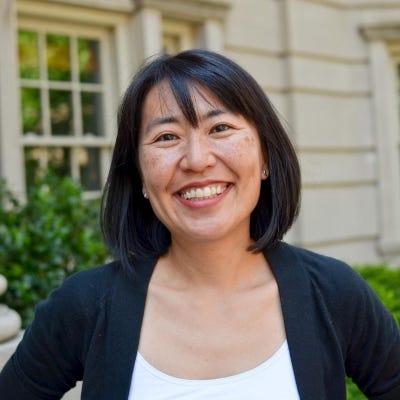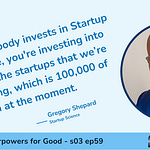Devin: Mari, what’s your superpower?
Mari: I love to learn new things, and I like to think that other people in this organization are motivated to learn new things because I’m constantly sending out Slack messages, e-mail messages, you know, about, check out this new article. Did you see what so-and-so said? Think about the implications for this. I find all this work incredibly important, incredibly fascinating. The other thing that I’m incredibly grateful for is that this has been a job where I learn every day.
You can watch the full interview with Mari here: mari.s4g.biz.
Mari Kuraishi co-founded and later led Global Giving, a nonprofit crowdfunding site for international development that could be the first crowdfunding site ever. She created it with Dennis Whittle (see Chapter 41) about a decade before Indiegogo or Kickstarter launched.
While at the World Bank, Mari learned that at the same time it was providing money to a few large institutions in each country, there were millions of people and small organizations working to solve problems. These folks needed money, too. She concluded that if they received the funds required, they could solve many of their own issues.
Years later, while networking, Mari met a person who responded to her introduction as a leader at Global Giving by saying, “Oh, I’ve heard of you guys. You guys work with the great unwashed.”
“My jaw dropped,” Mari says. “I mean, first, because the statement was outrageous, even back in 2001, right? But then I was like, ‘Yes, damn it. We are the outfit that works for the great unwashed.’”
And work she has. Since its founding, Global Giving has raised over $500 million for international nonprofits serving people in the developing world. In 2020 alone, donations reached $100 million.
Mari is proud of the flexible culture she led at Global Giving. Having come from a large organization with many rules, she helped form a company governed by values instead. The company focuses on the mission and challenges employees not to complete tasks but to contribute meaningfully to accomplishing the primary goal to help people in the developing world.
Mari says she’s not sure her ability and enthusiasm for learning have contributed directly to Global Giving’s measurable impact on people around the world. As the objective arbiter I’ve appointed myself to be, I am sure. Her superpower has helped change the world for the better.
How to Develop Learning as a Superpower
You can become a better learner. If you take to it like Mari, it can become your superpower. To help me with this book, Mari agreed to a follow-up interview that you can watch here: mari2.s4g.biz.
Mari notes that it is vital to know yourself. She observed that she liked to develop a plan and stick to it. Events that derailed her plans irritated her. Over the years, she’s learned to adapt and now celebrates the sorts of events that once annoyed her. She sees how even significant events that impose life-altering adjustments can be good things. She recognizes that she has found wonderful things at points in her life precisely because of a derailment.
Take time to get to know yourself. Mari says one of the vital things to understand about yourself and learning is that “people learn in different ways.” You need to know what sort of learner you are.
Scientists haven’t settled firmly on the number of discreet learning styles. One popular model is called VARK, an acronym for four learning styles.
Visual. These learners (I think I’m in this group) learn by seeing things.
Auditory. This group learns by hearing lessons.
Reading and writing. Such students learn best by reading and writing about a subject.
Kinesthetic. Some people learn by touching or by doing a task better than by other methods.
Most people learn best in one way, but that doesn’t mean they only do it in that style. It is easy to find simplistic online assessments to help you assess your learning style. That may be an excellent place to start.
Mari’s primary lesson about learning is profound. Rather than focus on learning facts, processes or skills, she talked about the need to learn about people. She said, “Every place and every person—even organizations—has a story that’s unique.”
The lesson from Mari is in how we get past the surface level familiarity with people to find deeper hidden realities. She uses the example of your reaction to a friend or colleague who says, “Oh, I didn’t sleep well last night.” What you say next will determine what you learn.
Imagine how different the response to each of the following reactions will be.
“Well, did you drink coffee last night?”
“Oh, I’m sorry to hear that; what was going on that made you not sleep well last night?”
From the second reaction question, you could learn something that matters. “You might discover something about that person that you had no idea about, even though you may have been working with that person for years,” Mari says.
“Happy families are all alike; every unhappy family is unhappy in its own way,” wrote Tolstoy as the opening line to Anna Karenina. Mari points out that learning to know people is about understanding Tolstoy’s message and applying it in our interactions with others.
As you think about learning, you may see yourself in Mari. You may be capable of learning as a superpower. I’m convinced it can help you change the world. If it’s not your superpower, it could at least make you happier.
“Anyone who is open to learning, and the change that comes from learning, might end up happier,” Mari says.













